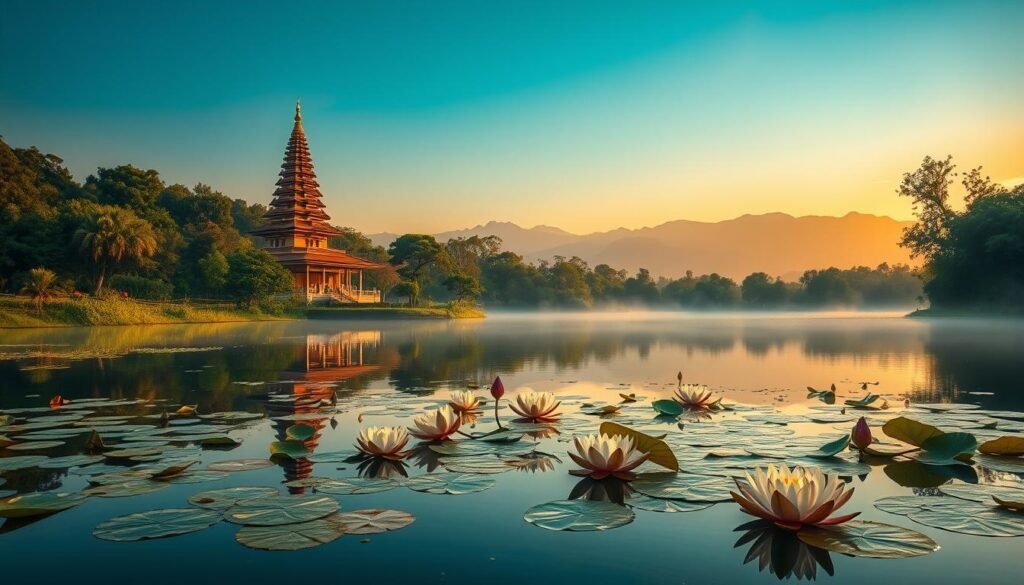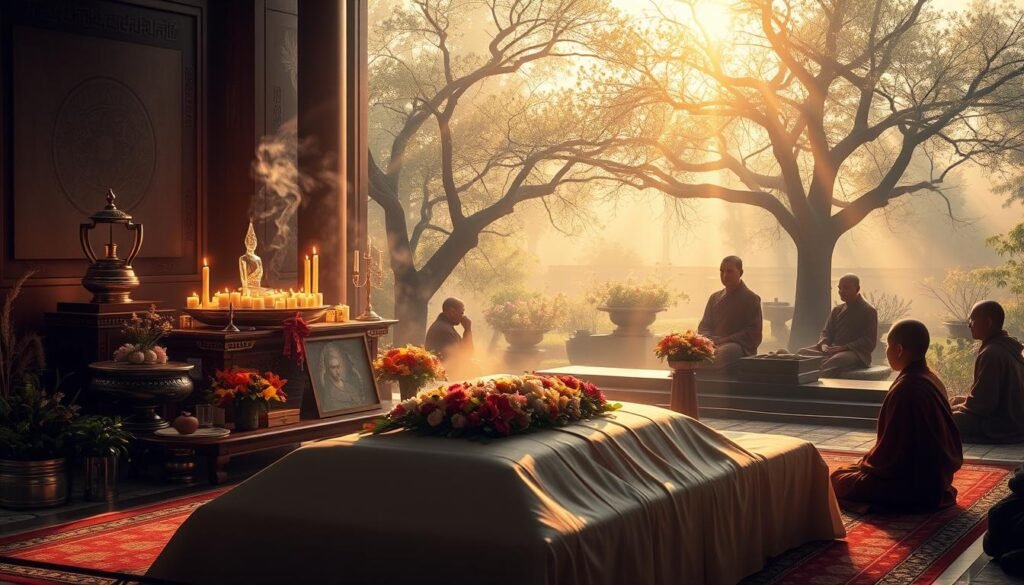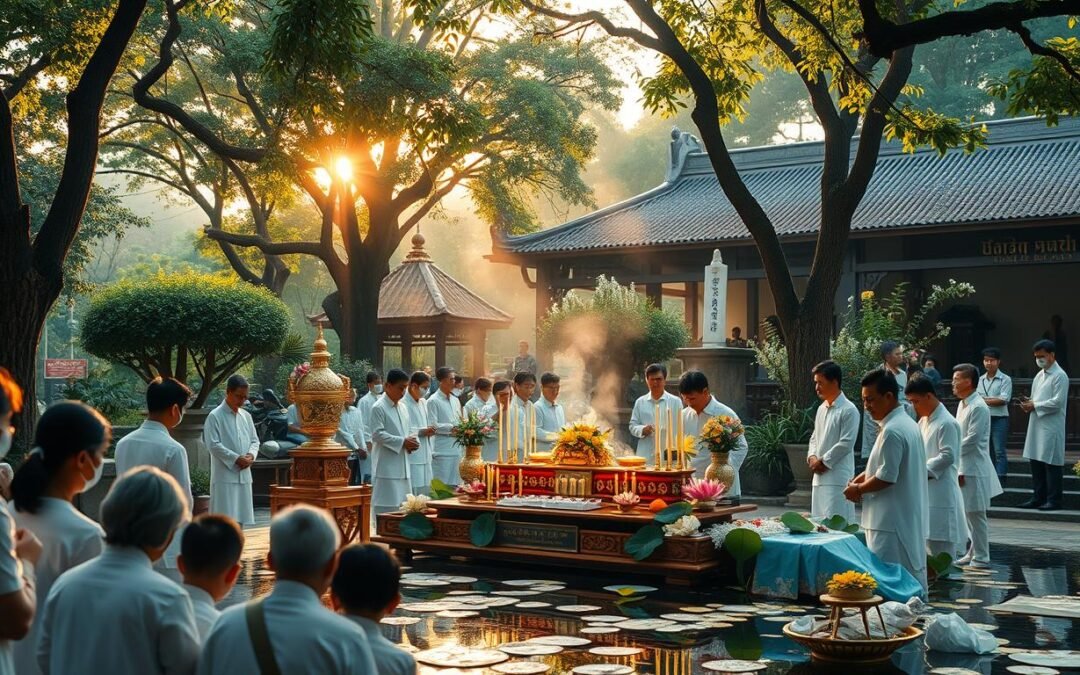The Buddhist funeral service in Singapore is deeply meaningful, showing the importance of Buddhist traditions. It reflects the beliefs of nearly 60% of the religious people in the country. This guide helps families honor their loved ones with respect and dignity.
Understanding these customs is key for those dealing with funeral arrangements in Singapore. It shows the respectful rituals at each step of the Buddhist funeral rites.
In Singapore, a 3-day Buddhist funeral costs about $5,988, while a 5-day one is around $6,988. Most families choose cremation due to the limited land and Buddhist beliefs in impermanence. The ceremony lasts from 3 to 5 days, sometimes longer for traditional practices. Ang Brothers Funeral Services provides a clear package, ensuring support without hidden fees.
Understanding Buddhism and Its Practices
Buddhism started over 2,500 years ago by Siddhartha Gautama. It focuses on finding enlightenment and inner peace. It believes in reincarnation and karma, which shape how people see life and death.
In Singapore, Buddhism has many practices that make life’s big changes meaningful. Families often choose cremation after someone dies. This choice fits with Buddhism’s view on life’s impermanence.
Buddhist funerals in Singapore last from 45 to 75 minutes. They include rituals from the 3rd to the 49th day after death.
Monks lead prayers, meditation, and sermons at these funerals. The clothes people wear depend on their culture. White is for family, and black is for friends. Bright colors and showing off wealth are not common, showing Buddhism’s emphasis on humility.
Buddhism sees grief as a normal part of life. Rituals are held on days like the 7th, 49th, and annual memorial days. These show respect and remembrance for those who have passed.
| Aspect | Details |
|---|---|
| Cremation Preference | Common choice in Singapore and among Buddhists worldwide |
| Funeral Duration | 45 to 75 minutes |
| Mourning Periods | Commonly include 3rd, 7th, 49th, and 100th day rituals |
| Attire | Family in white, friends in black; bright colors avoided |
| Involvement of Monks | Lead prayers and conduct ceremonies |
| Grieving Acceptance | Mourning is seen as a natural process |
The Philosophy of Life and Death in Buddhism
Buddhist philosophy gives deep insights into life and death. It sees them as part of a bigger cycle called samsara. This cycle shows that life doesn’t just end with death but moves into another form.
Death is seen as a big change, not the end. It’s a key part of the cycle of life and death.
The idea of impermanence is central. It means life is short and we should live fully. Death rituals help us understand this. They help the soul move on to the next life.
During mourning, people do good deeds to help the soul. These rituals happen at key times, like the third and 100th days after death. They help the soul move on to a better life.
Monks lead these ceremonies. They teach about life’s shortness. People wear white to show respect and grief. They do things like meditate and offer flowers to support the soul’s journey.
This philosophy makes us think about our actions and thoughts. It teaches us to seek enlightenment and do good deeds. This helps us in this life and the next.

Common Customs in Buddhist Funerals
Buddhist funeral customs are filled with deep traditions. They show the beliefs of the religion. These customs differ between Mahayana and Theravada, helping families honor their loved ones in meaningful ways.
One key practice is cleansing the body, showing respect and purity. After death, the body stays untouched for hours. This lets the spirit leave peacefully. Family members then mourn, showing their grief and respect through rituals like chanting and offerings.

At funeral wakes, people share memories and support each other. They often see the body in an open casket. Lighting joss sticks is a way to offer prayers to the deceased. Buddhist funeral customs also include a dress code, with women not wearing jewelry and everyone wearing dark clothes to show sorrow.
Rituals help keep the atmosphere calm. In Theravada, ceremonies on the 3rd, 7th, 49th, and 100th days after death highlight life’s impermanence. These events remind everyone of life’s cycle and offer a chance for the community to come together in grief and remembrance.
The customs and rituals of Buddhist funerals show the community’s values. From the body cleansing to the ceremonies that can last weeks or months, these traditions help give a respectful and spiritual farewell.
| Custom | Details |
|---|---|
| Cremation Rate | Approximately 85% of Buddhists in Singapore prefer cremation over other burial methods. |
| Embalming Acceptance | The acceptance rate of embalming within Buddhist funeral practices is about 30%. |
| Natural Burials | Only around 10% of Buddhist funerals opt for natural burials. |
| Mourner Dress Code | Over 75% of mourners adhere to wearing dark clothing during Buddhist funerals. |
| Further Services | Services often held on the 3rd, 7th, 49th, and 100th days after death. |
The Importance of Karma and Cause and Effect
Buddhism teaches a deep understanding of karma, a key concept that shows the law of cause and effect. What we do in life, good or bad, shapes what happens after we die. This belief in karma says that doing good deeds leads to positive outcomes, while bad actions result in negative ones.

At Buddhist funerals, the connection between karma and the afterlife is very clear. Activities like merit-making help the deceased get a better rebirth. In Theravada Buddhism, which is common in places like Thailand and Sri Lanka, making merit is a big part of funeral rituals. These rituals often include giving to monks or doing charitable work to create positive karma.
In Singapore, where Mahayana Buddhism is more common, funerals might have more elaborate rituals with Bodhisattvas. The focus is on making good karma, showing how our actions in life affect us after we die. Tibetan Buddhism also has special rituals, like guiding the deceased’s consciousness, as described in the Tibetan Book of the Dead. This highlights the role of karma in moving from one life to another.
There are special days for making more merit after the funeral, like the 7th, 49th, and 100th days. Prayers and chants during these times are thought to create positive energy. This helps the deceased move through samsara and improve their karma. Doing kind acts, like giving food or clothes, is even more important here. It starts a chain of cause and effect that can last beyond one life.
Grasping the importance of karma shows the duty of the living to act with kindness and pray. This shapes not just their own fate but also that of the departed. So, Buddhist funeral rites help the deceased transition smoothly and remind us of the lasting impact of our actions. They encourage us to live ethically.
Roles of Family Members in the Funeral Process
In a Buddhist funeral, family roles are key. They help with emotional and practical tasks during mourning. This support is vital during such a tough time.
Family members often prepare the body. They wash and dress the deceased in special clothes. This act shows respect and helps them cope with their loss.
At the funeral, family members lead the rituals. They chant prayers like the Heart Sutra. This creates a spiritual atmosphere and honors the deceased. They also welcome guests and help them feel included.

Mourning can last for days or even weeks. For example, rituals might go on for 49 days, as in The Tibetan Book of the Dead. Family members keep these rituals going, arranging prayers and acts of kindness for the deceased.
After the funeral, a memorial service called Gong Teck is held 100 days later. It aims to help the deceased have a better rebirth. This ceremony shows the family’s commitment to their loved one’s journey and strengthens family ties.
| Family Role | Responsibilities |
|---|---|
| Immediate Family | Prepare the body, lead rituals, offer comfort to mourners. |
| Relatives | Assist in organizing prayer sessions, participate in mourning gatherings. |
| Close Friends | Provide emotional support, help manage funeral logistics, join chanting. |
Grieving together helps families heal. It creates a support network. This shows the value of family and community in times of loss.
Buddhist Funeral Rites and Rituals
Buddhist funeral rites in Singapore mix old traditions with deep spiritual meaning. They honor the deceased. Cremation is preferred, seen as helping the soul move on to reincarnation.
Monks lead rituals and chant verses during the service. They offer comfort to the grieving and guidance to the soul of the departed.
Chanting sutras is a key part, lasting 90 to 120 minutes. This time lets families think about the good deeds of the deceased. Monks recite scriptures believed to help the soul’s journey.
The sound of bells adds to the service’s mood. It marks important moments.

During mourning, families give alms to monks. This act is a way to transfer merit to the deceased. They offer food and candles, showing goodwill and compassion.
Offering white flowers is a common sign of respect. It symbolizes purity.
Circumambulation of the casket is a significant ritual. It’s a walk around the casket, clockwise. It honors the life lived and brings the community together.
Attendees often wear white or dark clothes. White shows respect, while dark is for mourning.
Different Buddhist traditions, like Tibetan and Japanese Zen, have their own customs. Tibetan Buddhism has the First Bardo, a four-day trance period after death. Monks recite special verses to guide the deceased.
On the other hand, some Zen masters accept death deeply. Master Hofaku is an example.
These rituals help people deal with their grief. They honor the deceased’s legacy. The community, rituals, and devotion are key to Buddhist funerals in Singapore. They show a rich cultural heritage.
Through these practices, families connect with their beliefs. It helps them heal and reflect during their mourning.
The Buddhist Funeral Service
The Buddhist funeral service is filled with rituals to honor the deceased and help them on their journey. Families look at a detailed Buddhist funeral service overview to know what to expect. The events span several days, creating a calm space for everyone.
Overview of the Funeral Service
A Buddhist funeral includes a wake, cremation, and special rites. Families can choose from packages like the Buddhist Simplicity Package or the Buddhist Value Package. The Simplicity Package costs $5,888 for a three-day wake. The Value Package, with cremation and ashes collection, is $10,999.
These packages cover services like embalming, wake preparation, and aftercare. They ensure a respectful goodbye.
Typical Duration and Schedule
Buddhist funerals last from three to seven days, depending on the family’s wishes and rituals. The schedule might include chanting and offerings on certain days. Cremation takes about two and a half hours at the crematorium.
After the funeral, families can keep the urn at home, in a columbarium, or scatter the ashes after 100 days. This marks the end of the funeral period.
This careful planning lets families reflect and honor their loved ones. It also strengthens community bonds and Buddhist values during this important time.
Steps Involved in Buddhist Funeral Arrangements
Planning a Buddhist funeral can seem daunting, but knowing the steps helps. Families start by picking a funeral home that fits their cultural and spiritual beliefs. It’s important to compare the services and packages offered by different providers.
Choosing a Funeral Home or Service Provider
Look for a funeral home that knows about Buddhist traditions. When selecting a funeral home, consider these factors:
- Reputation in the community.
- Experience with Buddhist funerals.
- Transport services available.
- Choices for caskets.
- Services after the funeral, like ash collection.
The Life Celebrant (TLC) offers help with planning a Buddhist funeral in Singapore. They are ready to assist 24/7, providing support every step of the way.
What to Prepare for the Wake
Preparing for the wake is key to honoring the deceased and comforting those who mourn. Focus on these important details:
- Altar setups: Set up a space with images of the deceased and offerings like food, clothes, and other items to support their journey.
- Managing guest attendance: Organize the guest list and make sure everyone knows the wake schedule.
- Customary offerings: Prepare candles, incense, and flowers for the prayer rites.
The wake is a time for reflection. These preparations are vital for creating a respectful environment.
The Cremation Process in Buddhist Funerals
In Buddhist funerals, cremation is very important, thanks to Singapore’s land shortage. It fits with Buddhist views on change and rebirth. It’s a way to say goodbye with respect and keep spiritual values.
Buddhist funeral services in Singapore vary in cost. Prices range from $5,500 for a 3-day service to $6,000 for a 5-day one. These prices cover the cremation process and moving the casket to the crematorium.
At the crematorium, special rituals are done to honor the deceased. Family members might chant or pray, showing their love and respect. These rituals differ between Mahayana and Theravada traditions, adding to the cremation’s meaning.
After cremation, families may hold memorial services or make charitable donations. The mourning period is 49 days, with weekly blessings to help the deceased’s spirit move on.
The cremation process in Buddhist funerals is more than just saying goodbye. It’s a key part of the grieving process, bringing families together. It celebrates life and the cycle of existence.
Post-Funeral Practices and Traditions
After a Buddhist funeral, many customs are followed to honor the deceased and support the grieving family. These traditions are based on Buddhist beliefs and practices. They help create a sense of community and shared remembrance. Family and friends join in these rituals, which may last for a while.
Mourning Periods
Buddhist families may mourn for up to 100 days. Important days include the 3rd, 7th, 49th, and 100th days after the funeral. During these times, families gather to pay their respects, often with An Ling or Custody Services.
This period allows the bereaved to reflect on their loss. They find strength in the support of their community.
Memorial Rites and Ceremonies
Memorial rites are key in Buddhist post-funeral practices in Singapore. Ceremonies can be held at home, funeral parlors, or public spaces. They often include vegetarian food and chanting led by monks.
These rites honor the deceased and help the living heal. Giving charity and praying are also part of these practices. They acknowledge the cycle of life and death and promote spiritual growth.
Conclusion
Understanding Buddhist funerals gives us a deep look into the customs that help grieving families in Singapore. This guide shows how these practices reflect the core beliefs of impermanence and karma. Through rituals like chanting and offerings, families find comfort during tough times.
The summary of Buddhist funeral practices highlights the importance of these traditions. They show respect for life and death. Rituals like the wake, lasting from hours to days, offer time for reflection and support.
After cremation, ashes are often stored or scattered with meaning. This period encourages acts of kindness, showing the lasting bonds between loved ones. In a diverse society like Singapore, these customs are very important.
They guide families through their loss and strengthen their beliefs in rebirth, mindfulness, and compassion. By following these traditions, individuals honor their loved ones with respect and care.
FAQ
What should I know about Buddhist funeral services in Singapore?
What are the primary customs observed during Buddhist funerals?
How does karma influence Buddhist funeral practices?
What is the duration of a typical Buddhist funeral service?
What should I prepare if I am involved in arranging a Buddhist funeral?
How significant is cremation in Buddhist funerals?
What are the practices followed after the burial or cremation?
Source Links
- https://www.funeralservicessingapore.com.sg/buddhist-funeral-singapore/
- https://www.singaporefuneralcommittee.sg/buddhist-funeral-process/
- https://www.funeralpartners.co.uk/help-advice/arranging-a-funeral/types-of-funerals/buddhist-funerals/
- https://www.memorialplanning.com/resources/religious-funerals-guide/buddhist-funerals-guide
- https://www.singaporefuneralcommittee.sg/understanding-buddhist-funeral-services-in-singapore/
- https://www.empathy.com/funeral/buddhist-traditions-in-death-and-mourning
- https://www.bbc.co.uk/bitesize/guides/zyhmk2p/revision/4
- https://memorialfuneral.com.sg/blog/understanding-buddhist-funeral-ceremonies-and-beliefs-about-death-in-singapore/
- https://www.cpjfield.co.uk/planning-a-funeral/types-of-funeral/buddhist-funerals
- https://www.dignityfunerals.co.uk/arranging-a-funeral/types-of-funeral/religious-funerals/buddhist-funerals/
- https://en.wikipedia.org/wiki/Buddhist_funeral
- https://www.partinggoodbyes.com/blog-posts/understanding-karma-and-rebirth-buddhist-beliefs-about-death-and-funerals
- https://www.nirvanafugui.com/buddhist-funeral-rites-afterlife/
- https://www.singaporefuneralservices.sg/singapore-buddhist-funeral-services/
- https://eternityfuneral.sg/buddhist-funeral-ritual/
- https://embracefuneralservices.com.sg/buddhist-funeral-singapore/
- https://www.buddhanet.net/d_cermon/
- https://memorialfuneral.com.sg/blog/buddhist-funeral-rites-etiquette/
- https://www.singaporecasket.com.sg/preparing-a-buddhist-funeral-in-singapore/
- https://directfuneral.com.sg/our-funeral-products-services/buddhist-funeral-packages/
- https://memorialfuneral.com.sg/blog/buddhist-funeral-service-guide/
- https://www.confidencefuneral.com.sg/blogs/all-you-need-to-know-about-buddhist-funerals/
- https://www.thelifecelebrant.sg/resources-the-life-celebrant-tlc/how-do-i-arrange-a-buddhist-funeral-in-singapore
- https://www.singaporeobituary.com/guide-to-buddhist-funeral-prayer-rites/
- https://www.funeralsanctuary.sg/buddhist-funeral-services-in-singapore-practices-and-what-usually-occur/
- https://www.thelifecelebrant.sg/buddhist-funeral-services.html
- https://voffice.com.sg/understanding-buddhist-funeral-traditions-in-singapore/
- https://www.singaporefuneralservices.sg/2024/05/20/understanding-buddhist-funerals-a-journey-of-compassion-and-respect/
- https://funeralsyourway.com/buddhist-funeral-customs/
- https://www.nirvanasingapore.sg/singapore-buddhist-funeral-customs-everything-you-need-to-know/
- https://www.ljfs.com.sg/guide-to-buddhist-funeral-in-singapore-2023/




